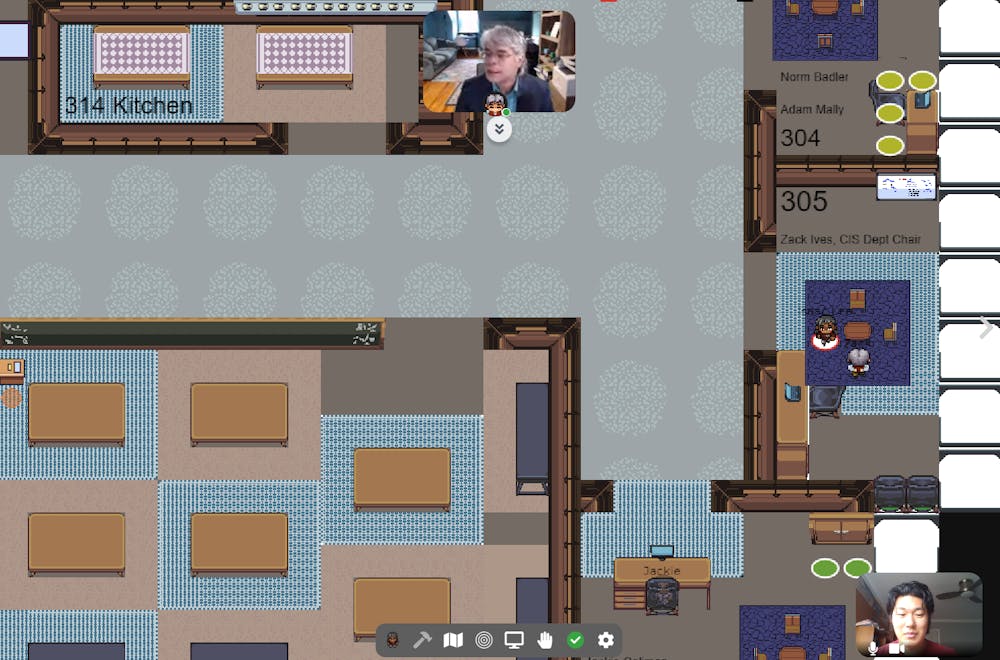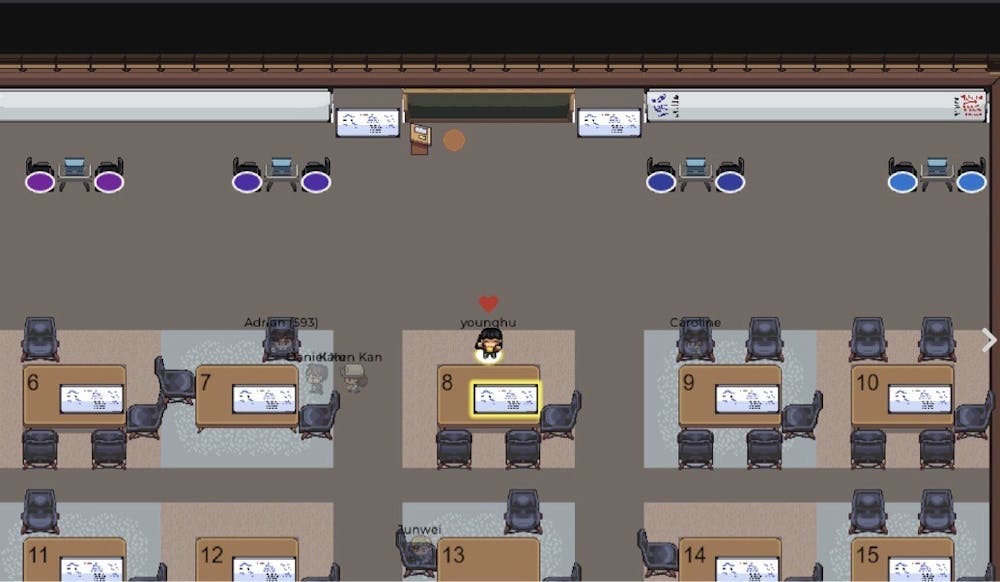
Computer and Information Science Department Chair Zachary Ives shows Levine Hall in Gather.town.
As students yearn for in-person interaction and the familiarity of their school buildings, platforms like Gather are filling the void — virtually.
Gather, also known as Gather.town, simulates buildings and classrooms on campus where students, professors, and teaching assistants can interact with one another through personal avatars during office hours. Its main feature, "Interaction Distance," launches a video call between users whose avatars are within five steps from each other in the virtual space. As the users' avatars walk away from each other, their video and audio quality decrease, simulating an in-person interaction.
The Computer and Information Science department has recreated Levine Hall, home to the CIS department and the Weiss Tech House, on Gather. The building has six virtual spaces, each representing one of the building's six floors, that students' avatars can walk around in, CIS Department Chair Zachary Ives said.
The layout of the virtual building, which can host approximately 200 users at a time, mimics the actual layout of the building, including classrooms, laboratories, elevators, stairwells, and a front office staffed with Penn employees to help students navigate the virtual spaces, Ives added.
“We are treating the platform as an open place where students can come in,” he said. “We’ve gotten some early feedback from our student population and there are a number of students who really like the experience and vastly prefer it to Zoom.”
The CIS department is working to implement the platform in all CIS courses, Ives said.
College and Wharton senior Hoyt Gong, who is a teaching assistant for CIS 545: Big Data Analytics, said students can click on a link provided to them on the class' Piazza page that will direct them to a digital room simulating a classroom scenario. Piazza is an online platform where students can post questions to which TAs, professors, and other students can respond.
“It has, if you can imagine, a lot of little desks, whiteboards, and chairs,” Gong said. “We all are little avatars where we’re able to walk around this little classroom setting and go up to other students.”
Ives pointed to some advantages of using Gather over Zoom. He said student-teacher interactions in Gather can be more spontaneous in comparison to attending scheduled Zoom meetings, as avatars can simply walk around the building and enter different classrooms at their own discretion. Students can also enter and exit small discussion groups more easily than Zoom breakout rooms, Ives added, by simply directing their avatars to walk away from a group as one would in a normal in-person interaction.
Users are unable to publicly video broadcast to all users in a virtual space without permission from the moderators, so incidents like 'Zoom bombings' — a term used to refer to hackers invading video meetings on Zoom — are less likely to occur, Ives said. Earlier this month, multiple large lecture classes held over Zoom were raided by unknown people yelling racial and homophobic slurs, forcing professors to end the classes prematurely.

Ives, who uses Gather to conduct office hours for his courses CIS 545 and NETS 212: Scalable and Cloud Computing, said, however, Zoom is more useful and easier to use for large lectures.
“[Gather] is best for an active learning, breakout-style discussion, but it does not have all the same capabilities as Zoom,” he said. “For instance, you can’t make any person able to broadcast to everyone.”
Lectures are possible on Gather using the spotlight feature, which allows users to broadcast to up to 100 people, Ives said. The feature, however, does not allow the person broadcasting to hear what the audience is saying, reducing its effectiveness in a lecture setting.
Ives discovered Gather over the summer while trying to find a replacement for OH Queue, the office hours software CIS classes previously used that created virtual queues for students who sought help in office hours, Gong said.
“We’re looking for ways to better engage our students and have a more interactive environment,” Gong said. “A normal social environment is helpful, and Gather is a way for students to connect with [each other].”
Gong said that he and the other 14 TAs for CIS 545 use Gather to conduct office hours throughout the week, serving an average of 10 students per two-hour session.
The School of Engineering is currently working to recreate more campus buildings on Gather, Ives said.
Engineering junior Julia Yan said she has used Gather to communicate with her professors and peers in the Materials Science and Engineering department. She also said the MSE faculty has replicated its lounge room in the Laboratory for Research on the Structure of Matter building to encourage students to virtually socialize and study together.
“I think using Gather to create a virtual version of our MSE lounge has kept us close despite being spread out around the world,” Yan said.
Students are also using Gather to recreate spaces for purposes beyond office hours.
Alpha Kappa Delta Phi, Penn's largest Asian interest sorority, recruited potential new members over Gather, at one point hosting 35 students in the same virtual space, College junior and akDPhi Rush chair Sabrina Tian said.
“I definitely think Gather Town is a better option than Zoom,” Tian said. “I think it was genuinely easy to learn and pick up.”
Yan, who co-chaired rush with Tian, agreed, but added that Zoom was still necessary to conduct presentations with a large audience.
“We used a hybrid kind of thing where we would start on Zoom, just because the spotlight feature was kind of hard to use for us.”
Students from Grace Covenant Church, which is recognized as a student organization by the Office of the Chaplain & the Spiritual and Religious Life Center, have used an early version of Gather called Online Town to recreate the church's weekly Bible study event, Friday Night Lights, College senior Eddy Yu said. Church leadership is still deciding whether to implement Gather into its events.
“Hopping into one group [of friends] and chatting with them and then leaving and hopping into a different group is something that I missed [during the remote semester],” Yu said.
The Daily Pennsylvanian is an independent, student-run newspaper. Please consider making a donation to support the coverage that shapes the University. Your generosity ensures a future of strong journalism at Penn.
Donate



